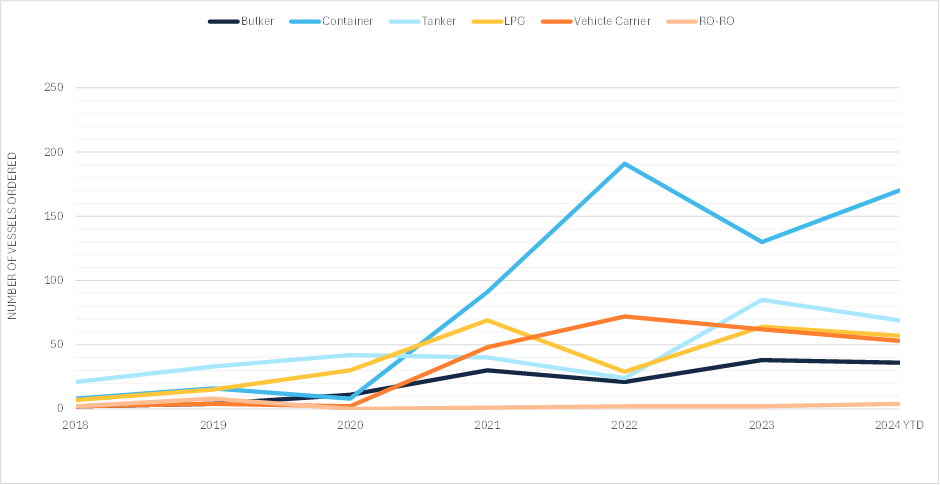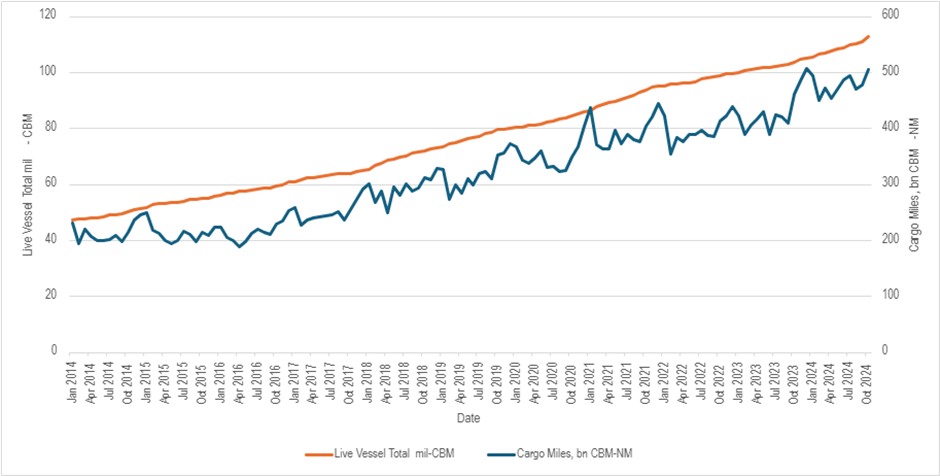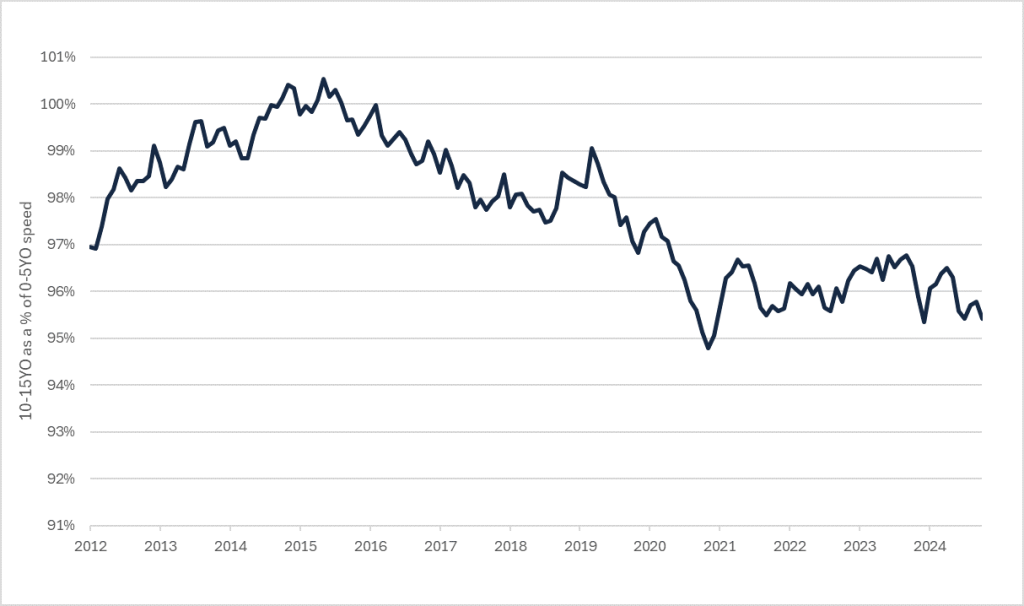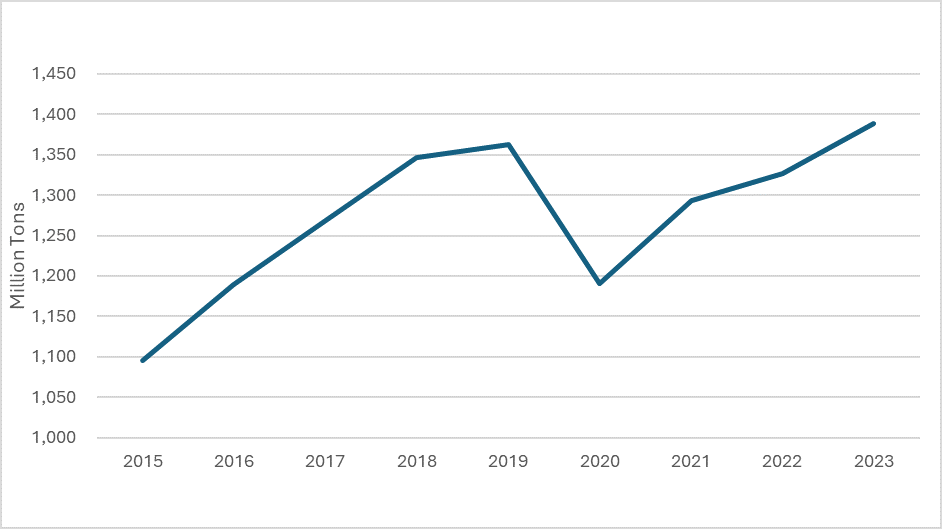According to Veson Nautical data, there are four trends that highlight some of the positives and challenges the shipping industry has when it comes to the energy transition.
The UN Climate Change Conference (COP 29) is currently being held in Baku, Azerbaijan, and delegates are meeting to try and find solutions to tackling climate change.
With 80-90% of global trade by volume transported by sea, the maritime industry is set to play a pivotal role in the energy transition.
The maritime industry itself accounts for just under 3% of the total global greenhouse gas emissions (GHG) annually, roughly the same as Germany and Spain’s combined.
Huge growth of dual-fuel vessels in key sectors:
Dual-fuel vessels orders in selected sectors 2018-2024 YTD

Dual-fuel engines can operate on both traditional marine fuels such as heavy fuel oil as well as less carbon-intensive alternatives like liquified natural gas (LNG). LNG vessels have been fitted with these engines for some time, but vessels from other sector’s, particularly container shipping, are catching up. Dual-fuel vessels are destined to play a bridging role as the global maritime industry makes its journey through the energy transition.
The above data charts the huge rise in orders for dual-fuel vessels over the last six years. There are still some gaps in the order book, particularly in thew ferry, offshore and smaller bulk carrier sectors, and a creative solution would need to be found that would allow smaller vessels to be equipped with dual-fuel engines. However, the higher costs, space constraints, and the lower operational range most of these vessels means that conventional dual-fuel engine technology is not viable.
“As the maritime industry begins to decarbonize many of the major shipping players are future proofing their fleets and this is particularly evident in the container shipping sector,” Rebecca Galanopoulos Senior Content Analyst at Veson Nautical says. “The fact that just 4% of container vessel with dual-fuelled engines was ordered in 2018 compared to 65% in 2024 gives an indication of the progress being made.”
The LNG fleet continues its exponential growth:
LNG fleet cargo miles and number of live vessels

With a global infrastructure stretching back decades, LNG is set to play a vital role as a bridge fuel for the energy transition, and the above chart illustrates its exponential growth over the past decade.
According to data from VesselsValue, the live LNG fleet has surged in capacity by ~142% from 47.1 million cubic meters to 113.9 million cubic meters in the last decade.
These numbers are supported by (cargo miles) growth which has more than doubled since 2014 from 230 billion cubic meters per nautical mile to 504 cubic meters per nautical mile.
With LNG supply set to increase by ~57 million tonnes per annum in 2026 the market for LNG carriers is set to increase with record numbers for the vessels being ordered in 2022 and 2023.
“The significant increase in the global LNG fleet shows owner’s confidence in the market, and the desire to replace some of the older less-efficient vessels in the fleet,” says Olivia Watkins, Associate Director of Valuations and Analytics at Veson Nautical.
“The maritime industry adopting more dual-fuelled engines that burn LNG is only going to increase demand in this sector further.”
Older bulk carriers are slowing down to meet IMO emissions targets:
Percentage difference between average speed of 0-5 year-old and 10-15 year old bulk carriers 2012-2024

The International Maritime Organization (IMO) is committed to lowering the carbon intensity of the shipping industry and has introduced regulations aimed at lowering emissions across fleets worldwide.
The new regulations have meant that owners of older bulk carrier vessels that were built with less-stringent design criteria than new vessels have had to find a creative solution to meeting carbon reduction goals. They have slowed down.
The bulk sector generally has less time-sensitive cargoes such as iron ore, bauxite, coal and other commodities which means slow steaming is possible. If a vessel slows down by just one knot it can result in a 15% decrease in GHG emissions. The above data from VesselsValue, shows how much the average speed of a newer vessel differs from an older vessel.
“Before the market spike for bulk carriers in 2021, newer vessels were travelling 5% faster on average than older vessels and we are not far from that again,” Oliver Kirkham, Valuations Analyst at Veson Nautical says. “Our data supports the concept of an emerging two-tier market because as the bulk carrier fleet ages, a premium can be levied on newer, faster vessels.”
The global seaborne coal trade is rising not falling:
World total seaborne coal trade

According to a report published earlier this month by the Coal Transition Commission (CTC), coal remains the largest source of electricity worldwide, representing 36% of generation globally, and accounts for over 40% of all energy sector emissions of carbon dioxide. The CTC, launched in 2023 at COP 28 by President Macron of France, acknowledges that transitioning away from coal, especially in developing nations, is going to pose of the greatest challenged to the energy transition, and as the chart above illustrates the issue is going to get worse before it gets any better.
The global seaborne coal trade hit record highs in 2023 with 1.388 billion tonnes (Bt) being shipped to consumers across the world according to commodity market intelligence provider Oceanbolt. Chinese coal imports were the main driver of the record figure in 2023, increasing 61.8% year-on-year to 474.42 million tonnes.
“Last year was huge for the seaborne coal industry,” Mikkel Nordberg, Senior Maritime Analyst at Veson Nautical says. “We estimate the 2024 figure is going to be slightly lower than 2023 at 1.1363 Bt, but these are still massive numbers and give an excellent indication of the work that still needs to be done to transition away from coal.”
































































